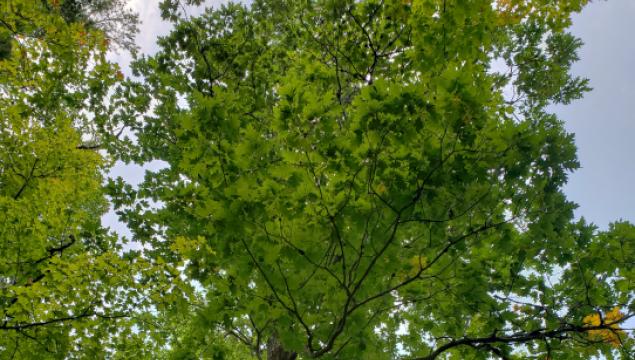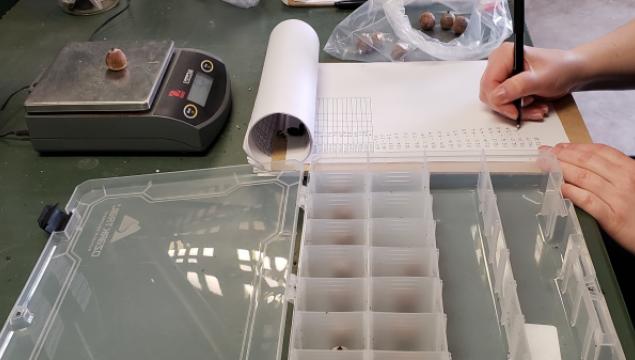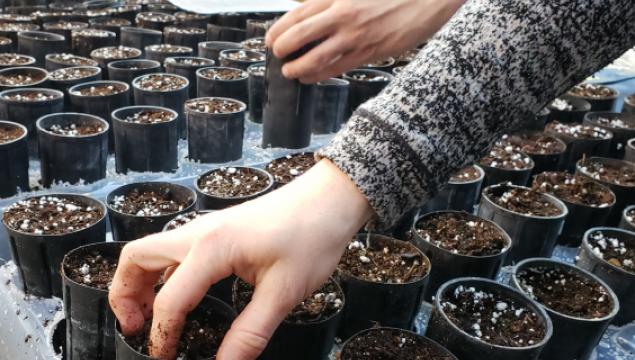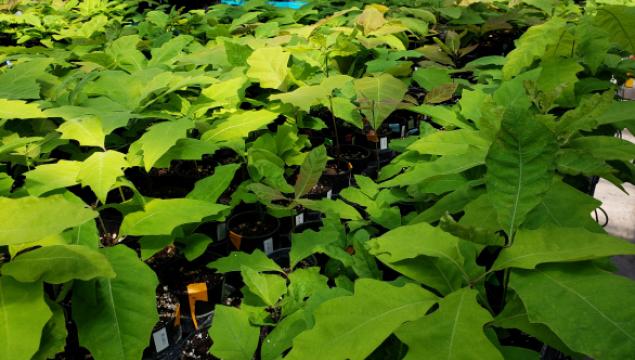Adopt-a-Tree: Red Oak Adaptation to Environment
Why This Project Is Important
Climate change is affecting forests around the world with higher average temperatures and an increased frequency of extreme weather events such as drought. The latter requires trees to be able to withstand short periods of weather extremes, while the former can lead to long-lived trees not surviving the environment in which their ancestors evolved. Naturally occurring migration is not fast enough to keep up with climate change, so assisted migration of trees is becoming necessary. In this project, we aim to identify the mechanisms of adaptation to climate in red oaks, and to produce genetic markers that will allow selection of trees for specific, current, and future environments. Without assisted migration, our forests may not be able to survive.
Project Description
What makes trees adapted to where they grow? Some tree species grow across very different climate zones. Northern red oak, for example, grows from Louisiana to southeast Canada, and from Maine to Minnesota. Its close relative, Northern pin oak, likes to grow on sandy soils across the northern distribution of Northern red oak. Sandier soils are more drained so these trees have to survive with less water. In this project we will plant ~2,000 trees of Northern red oak, Northern pin oak, and hybrids of the two species. Acorns were collected from Tennessee to Michigan, and from Wisconsin to Virginia, to cover much of the geographic range of both species. The trees are growing in the greenhouse at Michigan Tech right now, but will be transferred to two experimental forests in June 2019: The Ford Center and Forest near L'Anse, MI and the Kellogg Experimental Forest near Kalamazoo, MI. We will measure the growth of the trees, and leaf, branching and root morphology. We will measure physiological parameters such as photosynthesis and respiration, and we will investigate differences in leaf chemicals. After sequencing the trees' genomes, we will be able to find out which genes allow trees to adapt to their environment. This will enable selection of the best trees for changing climates, and avoid large scale extinction of forests and wildlife.
Meet the Researcher

Carsten Kuelheim
Carsten Külheim graduated with a BS from Umeå University in Sweden with a major in Plant Molecular Biology in 2000. He completed his PhD in 2005 at Umeå University, having worked with short term adaptation mechanisms in photosynthesis to changes in light environment. Dr. Külheim then moved on for a two-year Post Doc at The University of British Columbia in Vancouver, Canada, where he worked on plant-herbivore interactions using poplar as a model system with funding from the Swedish Research Council. In 2008 he joined the Australian National University continuing in the field of plant-herbivore interactions with the focus on Australian Myrtaceae. His work focuses on the genetic basis of quantitative and qualitative variation of plant secondary metabolites in eucalypts and tea tree. In August 2018, Dr. Külheim started a faculty appointment as Associate Professor at the School of Forest Resources and Environmental Science at Michigan Tech University. Here, he is investigating the genetic basis of adaptation to the environment in red oak through genomic, metabolomic and physiological approaches. Dr. Külheim’s research is applicable to conservation biology, nurseries and reforestation industries as well as essential oil producing industries.
days left
funded
last
What Your Donation Can Help Us Do:
- You donation will allow us to purchase supplies for field and laboratory work and enable participation of undergraduate students in this project.
$100 (0/50)
Annual report on adopted tree, including photograph
$50 (0/100)
One performance report and photograph of adopted tree
$25 (8/200)
Photograph of adopted tree
Recent Donors
Some donors may be hidden.








 Gifts to projects listed on SUPERIORIDEAS.ORG are received and processed by Michigan Tech Fund. Michigan Tech Fund is a tax-exempt organization under Section 501(c)(3) of the Internal Revenue Code acting on behalf of Michigan Technological University. It is the policy of Michigan Tech Fund that a portion of the gifts and/or income therefrom may be used to defray the costs of raising and administering the funds.
Gifts to projects listed on SUPERIORIDEAS.ORG are received and processed by Michigan Tech Fund. Michigan Tech Fund is a tax-exempt organization under Section 501(c)(3) of the Internal Revenue Code acting on behalf of Michigan Technological University. It is the policy of Michigan Tech Fund that a portion of the gifts and/or income therefrom may be used to defray the costs of raising and administering the funds.
Questions for the Researcher